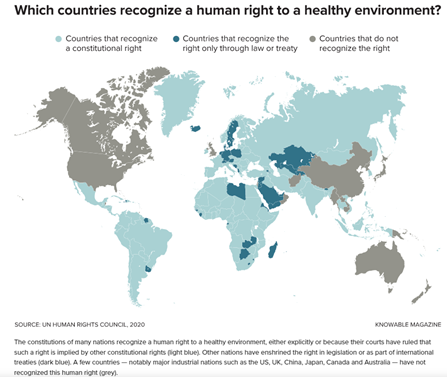

30th July 2022 (7 Topics)
Context
Every person on the planet has the right to live in a clean, healthy environment, declared United Nations (UN) in a historic resolution.
Significance:
- The landmark development demonstrates that the member states can unite in the collective fight against the triple planetary crisis of climate change, biodiversity loss and pollution.
- The resolution will help to reduce environmental injustices and protection gaps.
- It can empower people, especially those in vulnerable situations, including environmental human rights defenders, children, youth, women and indigenous people.
- The right to a healthy environment is one of the essential requirements for leading a dignified life.
- People have to hold their governments accountable to get these rights delivered.
- The declaration adopted by over 160 UN member nations, including India, is not legally binding.
- States who abstained: China, Russian Federation, Belarus, Cambodia, Iran, Syria, Kyrgyzstan and Ethiopia.
- It will encourage countries to incorporate the right to a healthy environment in national constitutions and regional treaties.

India’s Stand:
- India has voted in favour of a UNGA resolution that recognises the right to a clean, healthy and sustainable environment as a human right.
- However, India dissociated itself from an operative paragraph of the text and voiced its concerns over the procedure and substance of the resolution.
- India asserted that the UNGA resolutions do not in themselves create binding obligations, and it is only through conventions and treaties that State parties commit to a new human right and undertake appropriate obligations for the realisation of such a right.
- India points that the resolution fails to have a clear reference to the foundational principle of equity in international environmental law.
- India had also expressed its concerns clearly and repeatedly, and made constructive proposals to achieve a common ground.


